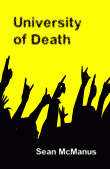Gamekeeper turned poacher
23 February 2008
 I had my first interview about my novel 'University of Death' yesterday. It was a strange experience being on the other end of the interview: usually, I'm the one trying to pose questions that will make the interviewee stop and really think hard about giving an original answer. This time, I was the one thinking 'gosh - didn't expect to be asked that'.
I had my first interview about my novel 'University of Death' yesterday. It was a strange experience being on the other end of the interview: usually, I'm the one trying to pose questions that will make the interviewee stop and really think hard about giving an original answer. This time, I was the one thinking 'gosh - didn't expect to be asked that'.Although there were surprises, it wasn't too difficult. The journalist was well prepared and extremely professional. She gave me time to answer without interrupting and left a nice long pause after I'd replied to check I really had finished speaking (just like I do when I'm doing interviews).
I gabbled away no problem, but at the end had a suspicion that I hadn't answered the question some of the time. It's easy to do: you get so carried away with all the stuff you could say, that you fail to bring it back to why you started talking about that stuff in the first place. I was caught in the middle of a writing deadline frenzy when the phone rang, which didn't help, but for the next one (he says, presumptiously), I'll try to slow down and speak much more in 'bullet points'. And I'll use a notepad so I can write down the question at the start to make sure I'm actually answering it.
One of the questions I was asked was whether I'd been in a band before and whether that's where the whole 'struggling band' storyline came from. I hadn't expected that.
I was in a band at university for about a term, but none of us took it very seriously. There were four or five of us, and we had nothing in common except that we all wanted to play at least one gig. We used to rehearse in my tiny campus bedroom (without the drummer).
There was a singer called Zoe, a guitarist called Richard, a drummer we borrowed from another band, and me on keyboards. There might have been someone else - I can't remember. We played in the students' union bar on a 'band club' night, and there were probably about 30 people there. We only played covers: 'Thinking about you' by Radiohead, 'Weather with you' by Crowded House, 'More than Words' by Extreme, 'Twist in my sobriety' by Tanita Tikaram and 'Wish you were here' by Pink Floyd. You could have called us lots of things, but 'punk' wasn't one of them. The setlist was a distillation of what four people with nothing in common could agree on, and what we could reasonably attempt with our limited talent. We put as much imagination into our name as we did the setlist: we went out as a covers band called 'Blanket'.
I remember it being too dark to see the keys properly, and remember my fingers being sweaty and sliding on the keyboard. But once we'd got through the first song (can't remember which it was) and got some applause, it all got a lot easier.
At the end, this guy came up to me and told me that 'Wish you were here' was his favourite song ever. That made me nervous. I knew I'd fumbled one of the notes at the start and I knew how I felt about my favourite songs: pretty defensive. "Thanks for playing it," he said. "I love that song and I've never heard it live before. That was brilliant." He'd had a few, but he meant it. We'd made his night. And he'd made mine.
My experience was completely different to the performers in the novel. I wasn't good enough to wing it, so I had to concentrate on what I'd practised and repeat that. The characters in my novel (even those jamming in obscurity) are all talented musicians, who can play intuitively and really relax into a performance and turn it into something creative, feeding off the energy of the crowd. In many ways, Simon's band Goblin is an ambassador for all those fantastic bands on MySpace who have about 50 fans and who deserve a bigger audience that just isn't there for them.
I didn't tell the journalist all this. I just told her I was in a band at uni, but we didn't take it very seriously and we weren't very good. But maybe, for that one night, we were good enough. If that guy heard his favourite song played live, and it made him feel something, then perhaps the odd bum note and complete lack of chemistry on the stage don't matter. If you're in the audience, half the gig's in your head anyway: it's about how you respond to the music, and the thoughts and feelings it evokes in you.
University of Death:
Download the first two chapters | Author interview | Buy now
Labels: books, music, university of death
